Wrap-Up
Congratulations to the 79 teams that finished the hunt, to the 381 teams that solved the intro round The Square, and to the 682 teams that solved at least one puzzle! Our top three teams were ፑ ETHIOPIC SYLLABLE TRALSE, exAM TEsters, and C[ardinality]s Get Degrees.
Here are some quick statistics for Galactic Puzzle Hunt 2022:
- 231,876 guesses
- 9,255 solves
- 3,841 hints answered
- 1 team found the hidden ending
This wrap-up will describe how we wrote the hunt and some lessons we learned (we learn more every year). Also check out the fun stuff at the end!
Plot summary
The hunt presents itself as the Galactic Aptitude Test (or GAP test), a supposedly one-hour exam. As you progress through the first few puzzles, you notice some peculiarities: the sixty-minute timer on each webpage ticks slower and slower, and the exact same puzzle appears twice. You find the exam too difficult, and by solving the first metapuzzle, you realize what you need is MORE TIME, and you finish the hunt (complete with airplanes on the leaderboard)!
This leads to the most peculiar part of the GAP test: after finishing the first metapuzzle and waiting for results, everything goes blank. You’re brought back to the beginning of the exam, and all your progress has disappeared. Solving the exam the same way repeatedly brings you back to the beginning; you’re stuck in a time loop! Eventually, you find that each puzzle has an alternate answer, and submitting enough of these leads to an alternate version of the metapuzzle with the answer GAP YEAR.
This opens a wormhole which leads to the year 2021. You find out that there was supposed to be a Galactic Puzzle Hunt in 2021 themed around preventing an asteroid impact via the Galactic Apocalypse Prevention (GAP) program, but no puzzle solvers showed up because we never ran the 2021 Galactic Puzzle Hunt. With their planet on the verge of destruction, the residents in this alternate universe created the wormhole to recruit the GAP test-takers (you!), which also interfered with the 2022 GPH puzzles and caused the time shenanigans. Solving the puzzles from 2021, you learn how to take the GAP test so that the wormhole arrives at different variations of 2021. This leads to three different rounds: Forward, Hibernating and Flying South, and World’s End Concert.
Each round’s metapuzzle gives a different device that helps in dealing with the asteroid: Forward gives you a SHUTTLECLOCK, Hibernating and Flying South gives you a THYME SCALE, and World’s End Concert gives you AIR HORNS. By combining these devices, you’re able to travel through spacetime, and build up energy to handle the asteroid. At the last moment, you realize there’s still not enough energy to destroy the asteroid. By solving one more puzzle in 2022, you realize that what the asteroid needs is a WHACK TO THE FUTURE. While you don’t have enough energy to destroy the asteroid now, you have enough to deflect it to a later time. The world is safe... for now.
As with all the puzzles in 2022, there is another answer — another way to deal with the asteroid. Congrats to Team Yuki, who were the only team to discover our easter egg, realizing that you can cover up the asteroid if you USE PAPER. They got to work folding all the paper they had, from their 2022 test booklets to their 2021 blueprints. They received a unique certificate for their accomplishment!
Writing the hunt
Here was our timeline for making the hunt.
- February 12: kickoff meeting
- March 14: theme selected
- May 10: delayed the hunt by 1 month (originally late July)
- August 12–13: full hunt testsolve
- August 26: hunt launches!
Theme
We had seven(!) theme proposals, many more than in past years. Unlike in previous years, at our kickoff meeting we did not have a leading theme contender (the themes in 2019 and 2020 were favorites from the start of the hunt writing process). This led to a lot of broad thinking about “what” we should make our hunt this year.
Time Loop (read original proposal) won on story, mechanics, and overall. We won’t reveal the other theme proposals in case they make an appearance in the future.
We were (rightfully, in hindsight) concerned about the difficulty of execution and the inflexibility (intro round puzzles all had to support two answers, one of which was easier than the other). Implementing the time loop took a lot of web development, since the time loop created a lot of new things to consider, such as creating and syncing two versions of the site (2021 and 2022), and how to unlock puzzles and the 2021 site over time. Additionally, each of the rounds required a significant amount of specialized code.
Hunt structure
It took us a while to iron out the details of the time loop. Nailing the structural details was a surprisingly long process that blocked puzzle writing for a while. In previous hunts, we didn’t have such overarching structural questions. Some questions that we answered and ideas that didn’t make it were:
- We toyed with a lot of “final metameta” ideas using the time loop. One idea for the final puzzle was to require teams to complete a “golden loop”, in which you have to figure out the unique way to solve every puzzle and complete every task before time runs out.
- The idea of having different rounds interact with the time loop in different ways was included from the beginning, similar to how different rounds in Galactic Puzzle Hunt 2020 had their own “gimmick”.
- What should the metapuzzle answers be or “represent”? We wrote the metapuzzles first under the constraint that the answer should be something that could be used to prevent the asteroid impact (allowing a broad interpretation), and then we wrote the metameta later.
- One idea was to use multiple-answer puzzles to branch the unlock structure. Depending on which answer you submitted, you would unlock different puzzles. The hunt would only ever show at most 10 puzzles, but by looping and taking different branches, you could access all ~40 puzzles.
- Would the loop timer be real time or something else, such as decrementing by a fixed amount for each guess?
- Could we make the final goal to break out of the time loop? In the end, breaking out of the time loop happened at the end of the intro round, which meant that many more teams got to experience it.
Although we had agreed early to use small, separate puzzles to unlock new rounds on the 2021 site, the navigation minipuzzles were solidified rather late. In feedback, solving a simple puzzle to unlock a new round of puzzles was well received by teams.
Puzzles and metapuzzles
As in previous years, we used Puzzlord to propose and track the status of puzzles. There are currently 63 ideas on Puzzlord, and there were 43 puzzles in the hunt. Here is the chart of puzzle writing progress.
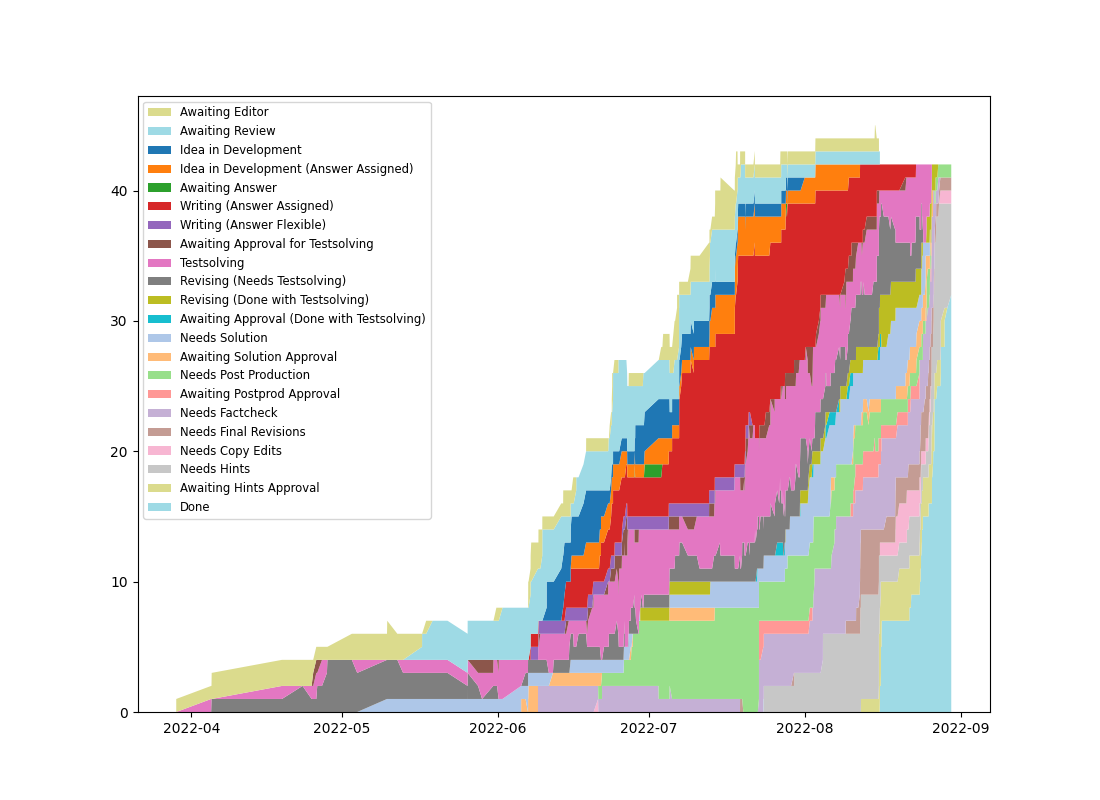
They’re not all “Done” but they’re all done.
The first metapuzzle is titled The Line (themed around a timeline), its alternate version is titled The Square (themed around Times Square), and we attempted to make the final metameta, titled The Cube, themed around the Time Cube. However, we didn’t have any great ideas for Time Cube, so sadly it didn’t happen.
Testsolving and factchecking
It’s hard to test certain things that are universally agreed-upon parts of the hunt structure for us, but will be completely new to solvers. For example, “noticing that all intro round puzzles had alternate answers” wasn’t something we were able to realistically test. At points we were worried it was too obvious.
- Extreme Anagrams had some really suspicious punctuation, but because it also appeared twice some solvers thought the two versions of it should have two different answers and the remaining puzzles were normal.
- Some solvers got both halves of a puzzle (e.g. What’s the Difference?) and tried to combine them rather than simply call in one of the answers.
- Many teams may have noticed that something was wrong on one or two puzzles, but did not think that every puzzle could have a second answer.
We ran a full-hunt testsolve (sans two puzzles, which were still being written) about two weeks before hunt. Testsolvers caught quite a few usability issues regarding the time loop. It also provided a lot of useful data with otherwise hard-to-test aspects of the hunt, such as the answer reuse in The Exam, as well as Hibernating and Flying South’s seasonal variations.
We were behind schedule on factchecking, no surprise. There weren’t many (any?) massive puzzle errors, though!
Hunt operations
We upped our social media presence. Like, subscribe, and share.
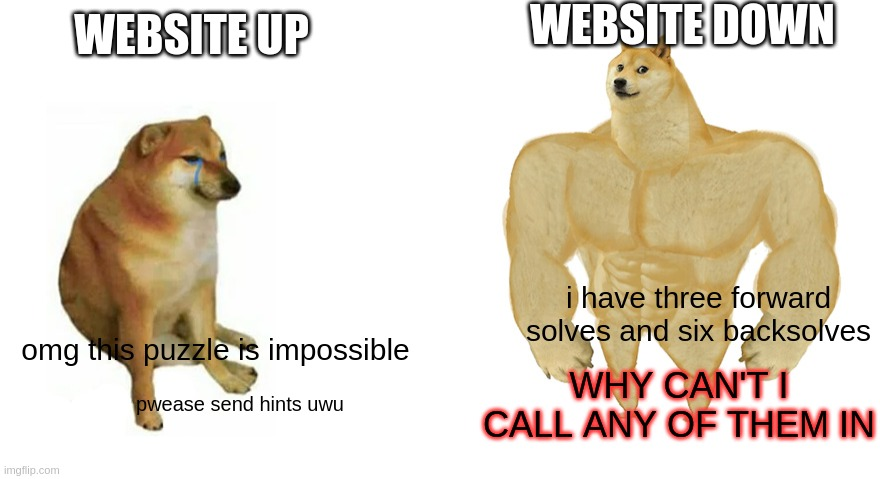
Figure 1: puzzle meme
As you probably noticed, the website was very slow during the first days of the hunt. Since Galactic Puzzle Hunt is just a single event, an issue like this that affects everyone in a negative way is not good at all. See more in the “Reflections” section about the issues we were facing.
For most solvers of the Galactic Puzzle Hunt, the first weekend is a time to solve some puzzles with friends, but reaching the end requires spending a lot of time over the next week and usually requires getting some hints. The top puzzles for hint requests were Shared Samples (239), The Line (206), and Three (113).
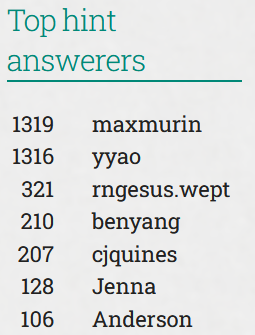
Did you ask for a hint? It was probably answered by Max Murin or Yannick Yao. #freeyannick #freemax
Reflections
Time loop
We are glad that we tried to make the very first round (The Exam) particularly unusual—lots of teams got to experience the surprise of the time loop and the double answers. It has become a trend in puzzle hunt design to write an introductory round that can sometimes be more straightforward, but we hope we succeeded in having a novel, but still accessible, round of puzzles in The Exam.
Reception of the time loop idea was largely positive for its innovation. The main usability issue with the time loop was the difficulty of navigation between different rounds, which required looping every four minutes or between seasons, and which also made it difficult to work on puzzles in different rounds. We didn’t really surface what this felt like from a solver perspective until our full hunt testsolve. At that time we improved the UX (e.g. by adding the “Stay” option on the loop ending page—the puzzles used to completely vanish!) but we know it was still frustrating for some.
There were a lot of edge cases with the complicated time loop structure, and some teams got stuck in ways we weren’t anticipating. For example:
- Some teams didn’t discover any alternate answers and looped the intro round over and over hoping to see new behavior
- Some teams tried to interact with the gadget after having solved The Line, and were confused when it had no effect, which was intentional but not well communicated (this is our best guess as to what these teams ran into; we only know tangentially of their cases)
- Some teams who time-unlocked the wormhole to 2021 did not realize that unlocking future rounds required them to submit the answer to The Square again.
Difficulty, length, and content
The difficulty and length of this year’s Galactic Puzzle Hunt ended up similar to the previous hunt, 20/20 Vision. On average, the puzzles in Galactic Puzzle Hunt are quite long and hard, but they are of a scale that we enjoy writing.
It feels like we ordered the puzzles well this year.
- We try to put puzzles earlier if they’re backsolvable or if they’re long but easier.
- We put horse_ebooks at the start to avoid a sudden wall of hard puzzles after finishing the first round (The Exam), to encourage solvers.
- We put some lighter puzzles at the end.
- We crudely arranged the metas in ascending difficulty. However, we felt that the average puzzle difficulty was descending in the rounds.
- However, based on hint requests and solves, Forward is not the easiest meta. We thought it seemed conceptually simpler based on testsolving, but it is probably the case that Forward was made slightly harder over testsolves (early drafts were static, literally saying something like +0:09:50, which more strongly suggests directionality). Meanwhile, the seasons meta was made slightly easier (the cluing of Banjo-Kazooie became more explicit).
A bunch of early ideas that came in were video game reference ideas, particularly Pokemon, where two very early puzzle ideas both wanted to use it. One of these became A Winding Walk (not about Pokemon). Ultimately the Pokemon puzzle that made it in our hunt was not one of those two ideas. Some of the other video game references also moved away from their video games (Changes). In another direction, we were quickly up to capacity in cryptic clue puzzles. Surprisingly, we felt like we didn’t have enough math puzzles for a while.
We had a lot of interactive puzzles! Maybe there were too many, if they caused the website load issues. The World’s End Concert round lends itself to interactivity, but plenty of other puzzles outside that round were also interactive. According to the quiz you filled out for Nobody Knows What Your Perfect Puzzle Is…, interactive games are the most popular “generation” of puzzles.
Website issues
Our website had much more substantial performance issues than in the past. Despite considerable effort throughout the hunt, we were unable to figure out exactly what was causing the issues, although we made a number of changes to help address them, including:
- Upgrading the VM
- There was a bug in our nginx configuration, which caused Django 500 errors to be redirected back to Django as a new request and serve a 404, and could have exacerbated things for a while. We eventually told nginx to serve a static 500 page
- We moved Changes and intense Make Your Own Puzzle Hunt subpuzzles off to separate VMs, so they wouldn’t be impacted by the slowdown
- These were easy, since they were stateless
- Speedy Crosswording couldn’t be easily moved due to loop state
- Upgrading nginx to resolve some websockets/SSL bug
- Logging request times in nginx
- Autokicking the server whenever bad things started to happen as judged by request times
The future
Will there be a Galactic Puzzle Hunt 2023? Join our mailing list to be the first to know! We like making innovative puzzles, and hope that you enjoy solving them!
In the interim, you should check out some of these other puzzle hunts coming up!
- Exploring the Countryside (October 8)
- Puzzle Boat 9 (December 3, paid)
- MIT Mystery Hunt 2023 (January 13)
Fun stuff
Here are some fun things from the hunt!
- Stories, funny guesses, and funny hints you sent us
- Answers to the questions you asked us in the post-hunt survey
- A themed Spotify playlist
_ _ 🐎
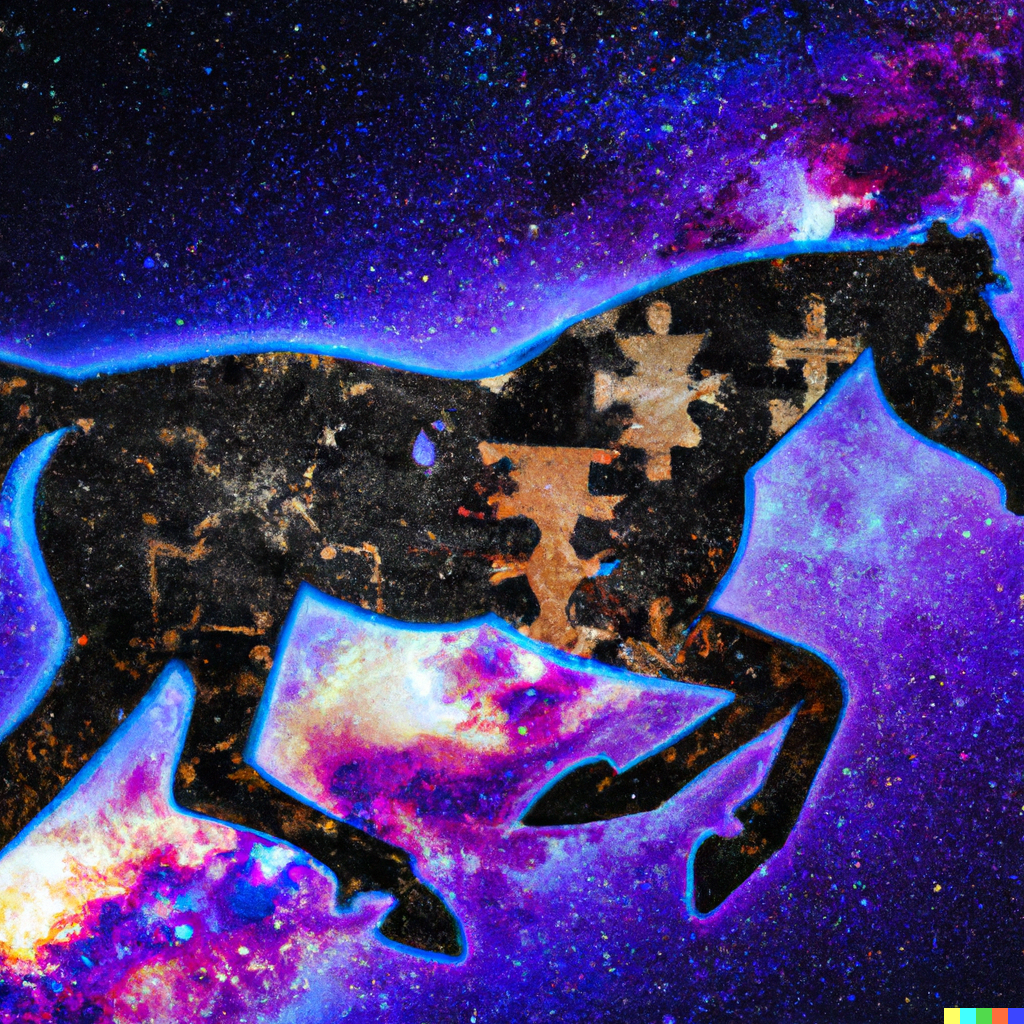
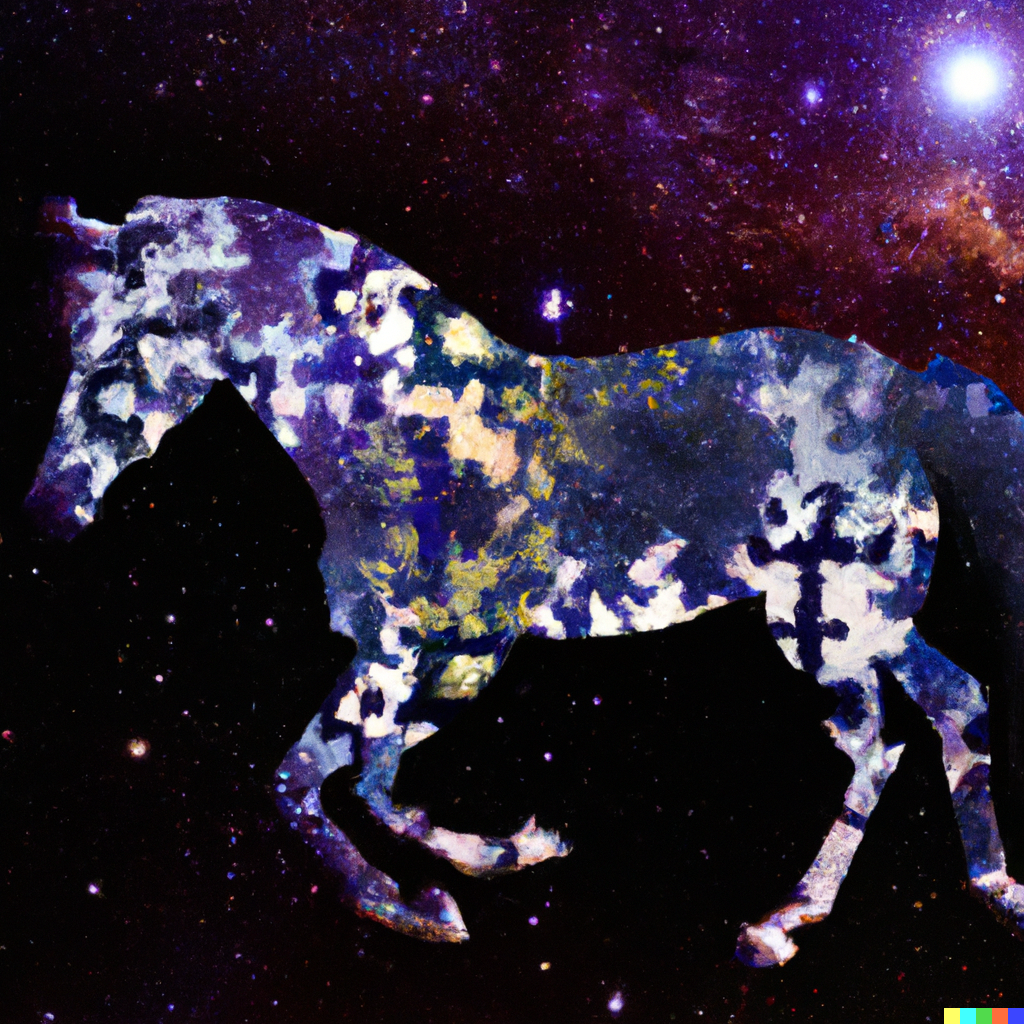
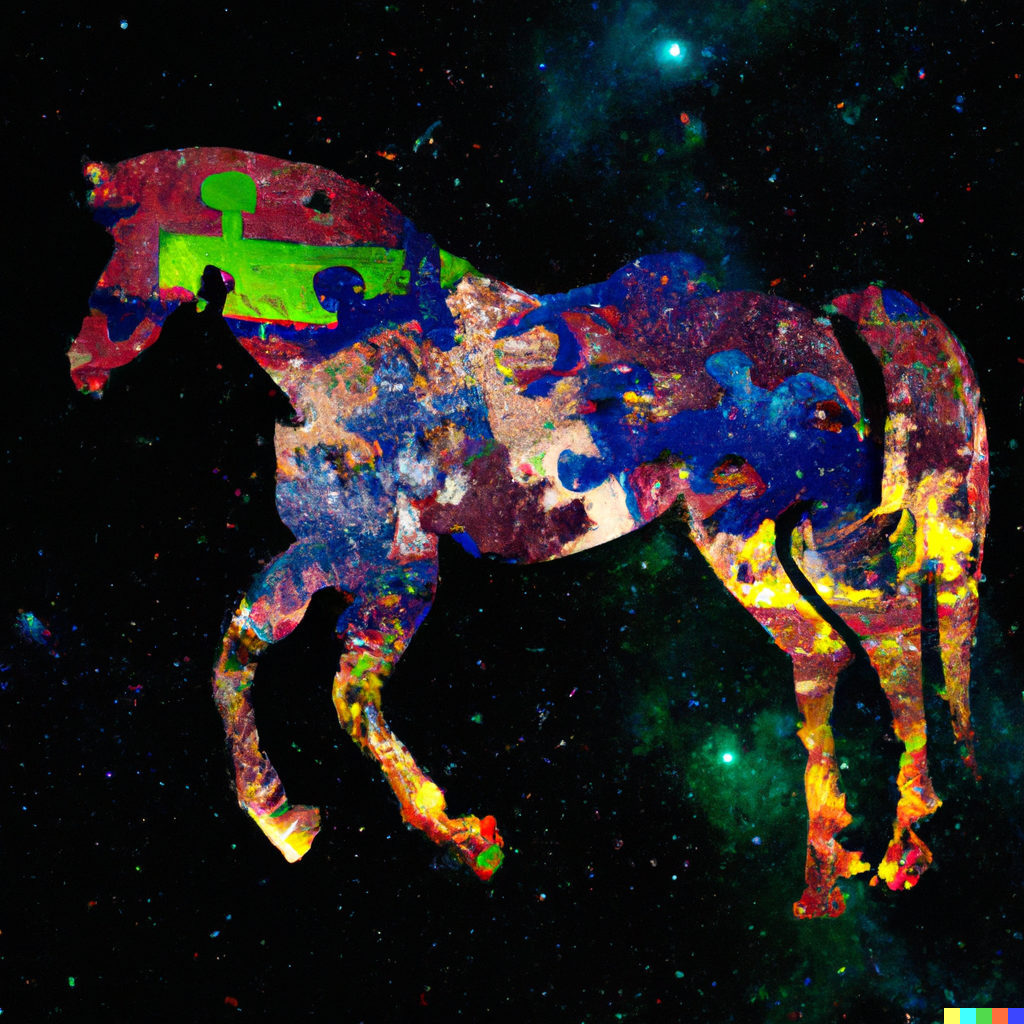
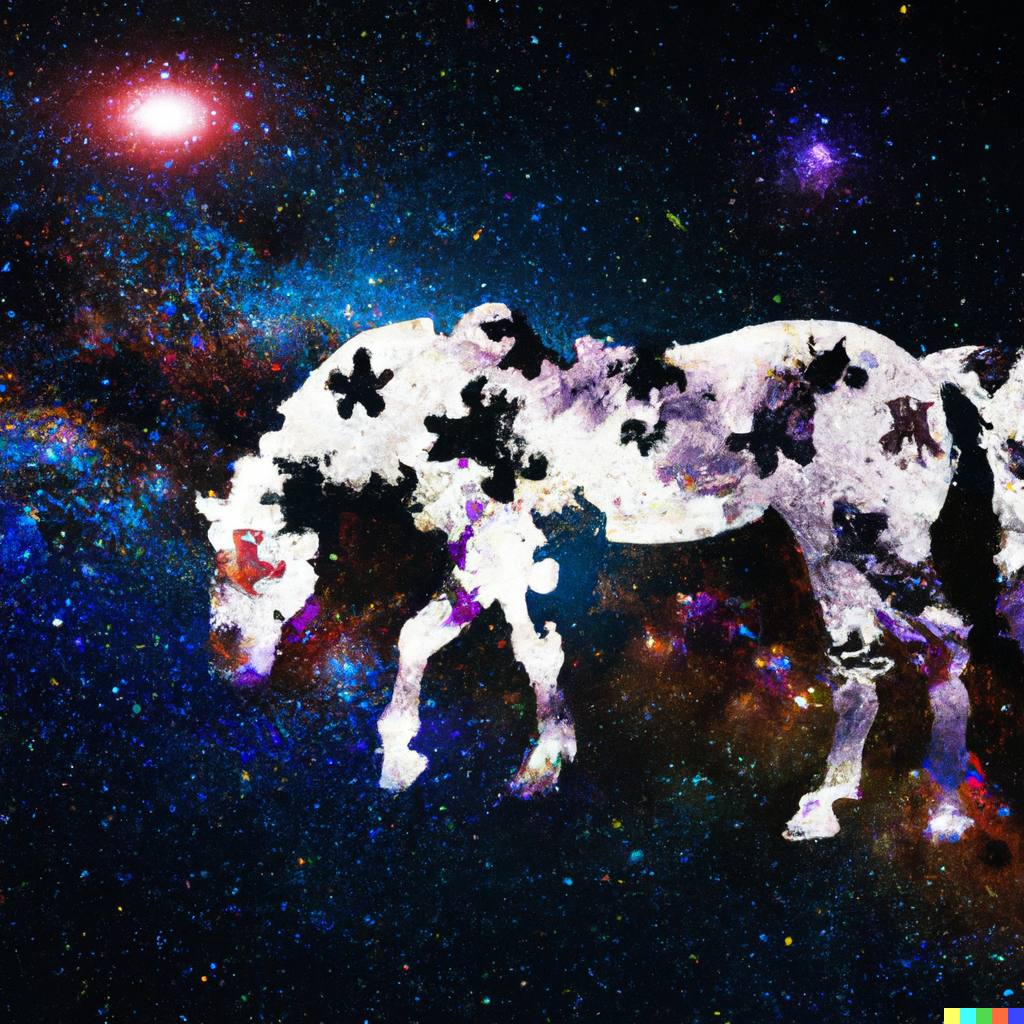
Statistics
Here are some charts and tables to help visualize how teams solved the hunt.
- Big Board (the page we use to monitor teams’ global progress)
- A general stats page with information on puzzle solves, hints used, and back solves
- A chart of solves over time for the first 30 teams to finish the hunt
- Progress charts for the 79 teams who finished the hunt
The 17 teams that finished without using hints were:
- ፑ ETHIOPIC SYLLABLE TRALSE
- exAM TEsters
- C[ardinality]s Get Degrees
- Eggplant Parms
- 🎏🎏🎏 SATisfACTory Herrings 🎏🎏🎏
- Killer Chicken Bones
- l + l = llama
- 17th Watermelon Bought in a Math Problem
- Arithmancers Necessarily Incompletely Marking Everything
- 1cool3me
- [URGENT] NO TIME TO THINK STEP BY STEP
- Needlessly Eating Scantrons
- Duck Soup
- Ten Apples
- ⢜ SCANTRON ANSWER KEY
- 🚀🚀🚀
- SnapDragon
Teams with the fewest loops (among hunt finishers):
- SnapDragon (63)
- Indescribably Overrated Heuristic (135)
- ፑ ETHIOPIC SYLLABLE TRALSE (150)
- o[pi]nionsoftheETS (162)
- Unexpected Items in Intentionally-Left-Blank Area (185)
- exAM TEsters (191)
- SwaDE fishers (197)
- Eggplant Parms (199)
- The FitnessGram™️ Pacer Test is a multistage aerobic capacity test that progressively gets more difficult as it continues. The 20 meter pacer test will begin in 30 seconds. Line up at the start. (199)
Teams with the fewest incorrect guesses (among hunt finishers, excluding the puzzle Three):
- l + l = llama (11)
- ፑ ETHIOPIC SYLLABLE TRALSE (18)
- if(possible){popsicle=true} (20)
- Good morning. As you know, you’re here to take the GAP. Congratulations on taking this important step toward your college and career goals. Before we begin the test, I am going to read some instructio (23)
- SnapDragon (29)
- The Saratoga Kicks (37)
- pluru (40)
- Indescribably Overrated Heuristic (41)
- The Invigilators (45)
- The FitnessGram™️ Pacer Test is a multistage aerobic capacity test that progressively gets more difficult as it continues. The 20 meter pacer test will begin in 30 seconds. Line up at the start. (48)
- Scenic Travelers (49)
Teams with the most loops:
- Resistant to Nail Polish (759)
- Les Gaulois (669)
- bed umber (612)
- Arithmancers Sneaking in Mechanical Pencils (594)
- Slitherlinks and Ladders (594)
- Quarantine Decrypters (571)
Teams with the most incorrect guesses (excluding the puzzle Three):
- Les Gaulois (206)
- Pet The Catloe (201)
- The C@r@line Syzygy (194)
- The real puzzle is the bodofronto we made along the way (185)
- :praytrick: (178)
Initial responses to Nobody Knows What Your Perfect Puzzle Is, But You Will After Answering These Nine Questions:
Answers by question (hover to interact)
“Perfect” puzzle distribution for teams’ “honest” initial submissions (hover to interact)
Credits
Hunt Creators: Josh Alman, Brian Chen, Jack Chen, Lewis Chen, Amon Ge, Andy Hauge, Jenna Himawan, Alan Huang, Chris Jones, DD Liu, Ashley Kim, Sam Kim, Bex Lin, Colin Lu, Mark, Seth Mulhall, Max Murin, Nathan Pinsker, CJ Quines, Jon Schneider, Charles Tam, Anderson Wang, Azalea Weisblat, Ben Yang, Dai Yang, Yannick Yao
Additional Testsolvers: Eggy Chen, Maddie Dawson, Nicholai Dimov, Alex Irpan, Bryan Lee, Kevin Li, Lumia Neyo, Leo Marchand, Ian Osborn, Alex Pei, Brian Shimanuki, Toomas Tennisberg, Ivan Wang, Patrick Xia, Patrick Yang, Leon Zhou
Editors: Brian Chen, Lewis Chen (Head Editor), Jenna Himawan, Alan Huang, Anderson Wang, Azalea Weisblat, Ben Yang
Website: Brian Chen(!), Amon Ge, Alan Huang, Jenna Himawan, Mark, CJ Quines
Other Positions: Jenna Himawan & Chris Jones (Chairs), Ben Yang (Taskmaster), CJ Quines (Scribe), Seth Mulhall (Onboarding Leader), Amon Ge (Email Coordinator), Mark (Testsolving Coordinator), Yannick Yao (Factchecking Coordinator)
Additional Thanks: Hannah Gazdus @wren_in_flight (Hibernating and Flying South art), Gordon Dylan Johnson @GDJ (OpenClipart silhouettes in World’s End Concert), sarawaleed (Piano Typer art), Esther Wang (Piano Typer programming)
Everything is going smoothly.